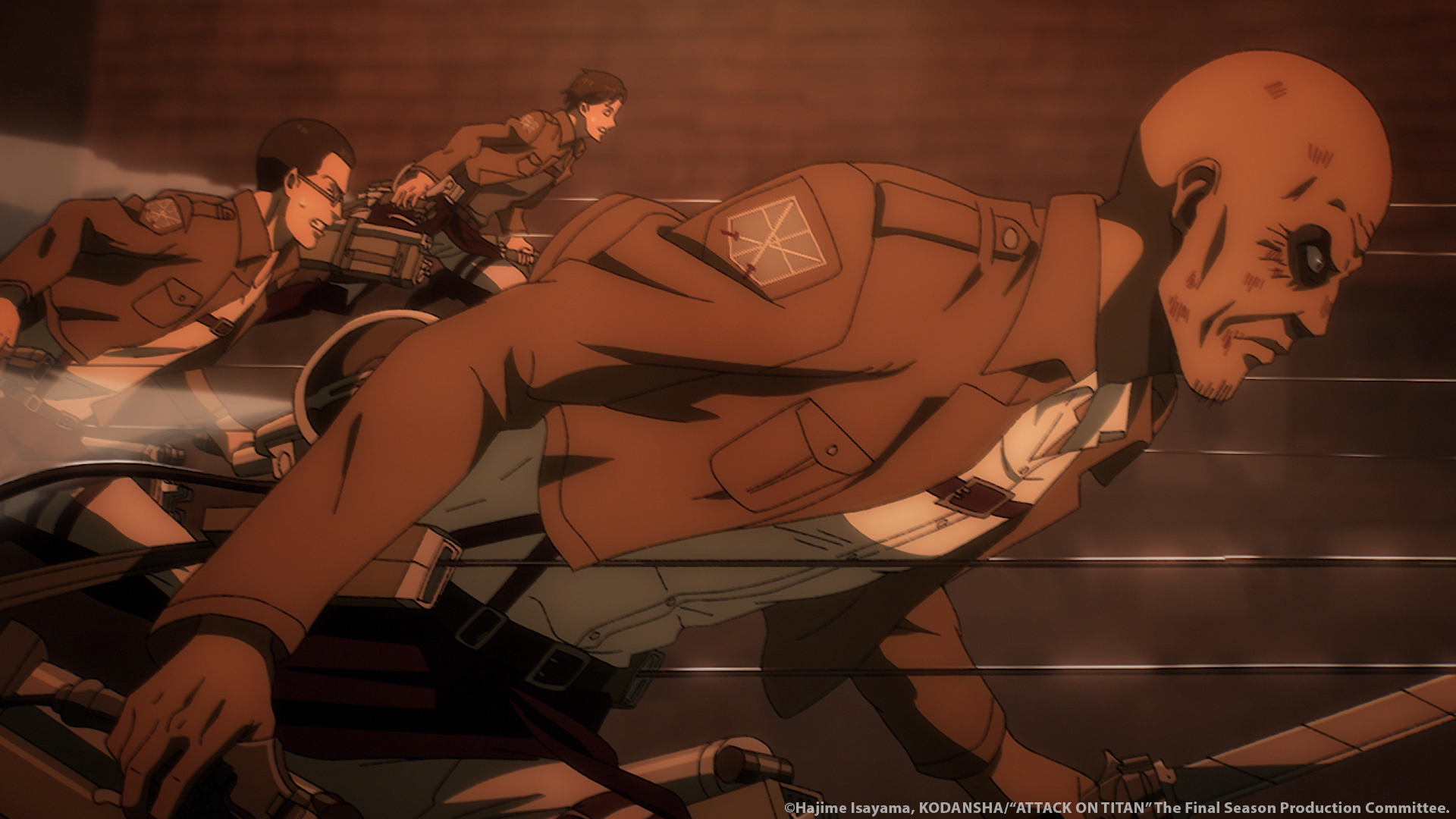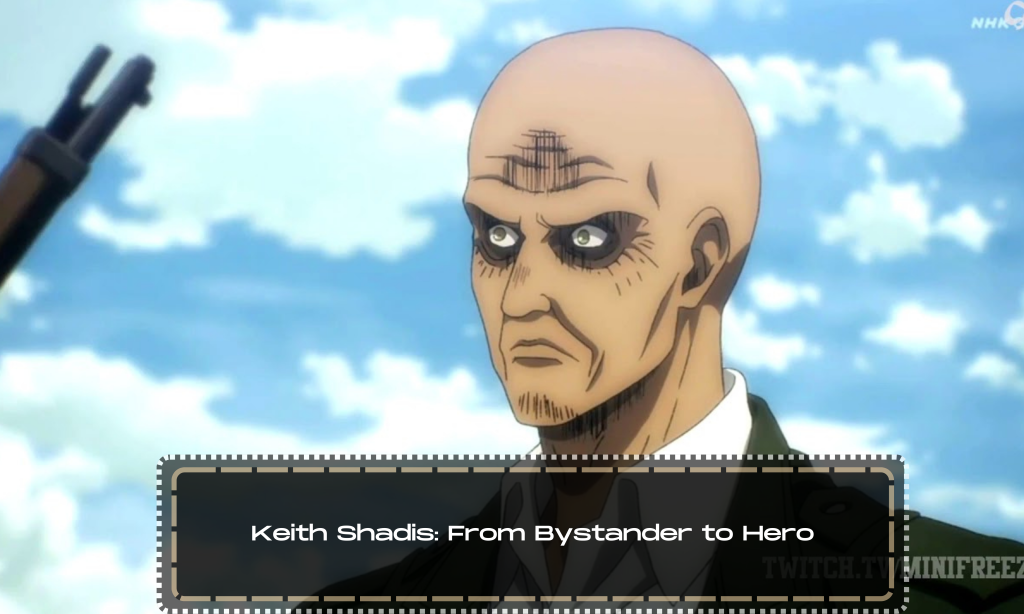Keith Shadis: From Bystander to Hero

All too soon, and yet somehow not soon enough, the world of Attack on Titan forced Keith Shadis to confront the limits and fragility of his abilities.
Despite being possessed by this ineffable yearning to seek lands and possibilities outside the cage he was born into, despite his great confidence in the idea that he was an extraordinary person capable of changing things and despite his rise to the rank of commander of the Survey Corps, like many others in this story, he was forced to face the nature of this cruel reality and his role in it.
Seeing the true example of almost divine heroism and progress through the likes of Erwin Smith, Shadis saw no other choice but to accept that he simply was not nearly as special as his own idealistic fantasies fueled by the words of Grisha Yeager framed him.
And as he watched the lives of others through the cage of resentment he put up around himself, he found that his life had unravelled into a torrid mire of misery and blood, where he could not face the world and himself without feeling bitterness and despair at the fact that he wasn’t, and was never, special.
But sometimes when we are tunnel-visioned and stuck in these negative cycles of thought, all it takes is a fresh outside perspective to tell us something and put a complexion on things that we may not have really thought of before. And in response to Shadis’ agony, Carla merely wonders what the purpose in viewing the world in this way is.
This sentiment may seem overly romantic, but the one thing that Attack on Titan consistently champions is the value of hope, light and idealism in the face of what seems like futility. From Carla’s beautiful viewpoint, the world need not be this cutthroat meritocracy. We need not define ourselves as superior to anyone else, or special.
But if special people do exist, the only criteria necessary is that they be born into this world. Just as Niccolo explains that we all have the potential to be devils, we all have just as likely a possibility of doing something special. Shadis took note of the special people in his life and concluded that he simply wasn’t one of them.
But what he would come to learn much later is that this didn’t mean that he didn’t have the capacity to become one, as Carla’s words allude to. This encounter wasn’t quite one that flicked a switch and stimulated Shadis to turn his life around immediately, but it seems like it planted a seed and provided the core idea that would manifest on his lasting impact on the world. And that impact was absolutely nothing short of special.
Now if we fast forward, we come to a point in the story that signifies a huge, proper momentum shift in favour of the Yeagerists inside the walls. As one of the most prominent and direct symbols of the former regime, Shadis is pointed out by Floch as a stagnant representation of the decaying, rigid old ways and as initiation, he orders prospective new Yeagerist recruits to beat the former Commander to within an inch of his life as a signifier of this shift.
And this is where we really, properly see Keith’s metamorphosis manifest. He does not shy away or try to dissuade the potential recruits, but instead provokes the situation further and essentially makes their decision for them. When he is freed later by Connie and company, he hides the nature of his injuries by saying he fought a bear.
And to complete this, when pure titans are running rampant and the green recruits are shocked at the gravity of the situation and need someone to help guide them and give them direction, Shadis provides exactly that. He protects them by provocation, does not divulge what happened to those who might punish them, and then comes around to protect the very people who beat him to within an inch of his life.
This in itself is one of the most admirable things I’ve seen a fictional character do, and I can think of no other word for a man who would do this apart from “special.” He is able to put all of that aside for the bigger picture – bringing everyone together, setting contextually minor squabbles aside in favor of combatting the threat in front of them. And.. I don’t know.

A man capable of this just doesn’t strike me as what he would describe as a bystander. Sure, maybe he’s not as outwardly imbued with that aura as others were. Maybe he was a bystander. But in my opinion, he is one no longer, and certain visual parallels we see here that are clearly reminiscent of people like Mikasa or Levi hint at that notion too.
Shadis realizes here that in spite of what he may have been before, he is needed here and he can have a distinct role. He may not be extraordinary in the way Eren or Erwin or Grisha are. But that doesn’t mean that he is incapable of using his life for something special. Like he says, he wasn’t really built to live outside this era.
Like Erwin, he was fated to live and die in this specific pocket in history as a remnant of the old regime, a symbol of an age long past. So as heinous as it was, you can see Floch’s logic in trying to beat him into submission as a metaphor. Like Shadis himself says, this is who he is. He is tied to that older generation, and his time was up the moment this upheaval started.
But what’s significant is that the complexion he puts on the nature of his role is totally different than Floch tried to make him out to seem. He decides to go out completely on his own terms. His time may be over, but he isn’t outdated, he still has a role that only really he can fulfill, and these scouts and his former students may well have died without him. And along with all this, Shadis imparts some very sage and pragmatic advice upon those that he saved.
It is extremely intelligent, perceptive advice that takes in the realities of the world as it is now and accepts the gravity of the situation while not abandoning hope. And it’s advice that he himself adhered to as well. When the time came, he refused to go along with the flow.
He stood up for the path he believed in, and he sacrificed himself and died with pride upholding those ideals and helping those that would carry on his legacy and spirit. Through seeing his students taking a stand and being the special people they are in fighting against what seems like a lost cause, through seeing Annie, who had previously come to arms with them and seemed to be one to go with the flow, instead fighting against it, Shadis is inspired.
To see this coming together and cooperation in the face of this great horror is something he never really conceptualized until it happened. But when it did happen, he found himself in awe, and totally moved. And this helps him to properly enact the final change, the extrapolation of what he had done so far, in the way he desired.
It paves the way for him, and he’s able to sacrifice himself not just because he never would’ve been suited to a life in the mountains, but because he wanted to help those he entrusted the world to, he wanted to contribute in a way that would allow them to potentially smile one day in the far off future.
And for someone who was obsessed with the recognition and prestige of being special, Shadis dies in a way polar opposite to all of that, yet more satisfied than he probably ever could have been in this situation. He is given no recognition, with none of the ones he died to protect even knowing that he did this, but nevertheless he can afford that small smile knowing that he did what he needed to do.
He comforts a kindred spirit in Magath when no one is able to, with these two adults carving forward the path for the children of the forest to escape. To me, Shadis is one of the most pristine examples in the story of Isayama’s phenomenal character writing and ability to form such natural yet moving contributions from so many of this cast, and the recontextualization we get through Bystander is something that’ll always be one of my favourite elements about the story.
But in all honesty what I take away most from him is something very empowering. I spoke in an earlier blog about how Jean was the most inspirational character in Attack on Titan for me, and that remains true. But Shadis is right there with him.
He is yet another take on the every man, and such an encouraging example of how regular, cowardly, bitter people can become special if we simply view things with clear minds and hearts and have the bravery to do what we believe is right, even if that may go against that flow. Not for recognition, or for glory, or to be special – simply to help those we care for and do our part to bring about hope in a world so dark.
It’s difficult, but in the end, it’s rather simple, and all that it requires is for us to be courageous, steadfast, strong and true. Just like Shadis. Many thanks for reading.
That’s me, Andreea Blaga, author of the blog anime-everything.com. I work as a content creator in the US. I am also passionate about Japanese Anime.


Related post
Character Study: Korra and Aang’s Legacy
In the richly woven tapestry of the “Avatar” universe, the characters of Korra and Aang...
Jul
Islands of Wonder: Exploring the Unique Geography of One Piece
Enter the vibrant world of One Piece, a beloved manga and anime series created by...
Jul
Unveiling ‘The Eminence in Shadow’: A Dive into its Intriguing Premise
“The Eminence in Shadow” is a light novel series written by Daisuke Aizawa and illustrated...
Jul
Dragon Ball Z: A Cultural Phenomenon Through the Ages
Since its debut in 1989, “Dragon Ball Z” has become a cultural phenomenon that transcends...
Jul
Unleashing the Chainsaw: A Deep Dive into Chainsaw Man’s Gripping Plot
In the realm of dark fantasy manga, few series have captivated readers quite like Tatsuki...
Jul
Aang’s Journey: From Reluctant Hero to Avatar of Peace
In the world of animated series, few have captured the hearts and minds of viewers...
Jul